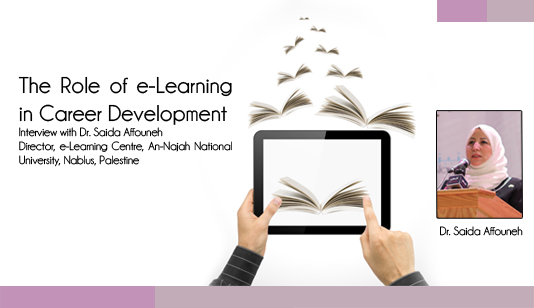The Role of e-Learning in Career Development
Interview with Dr. Saida Affouneh
Director, e-Learning Centre, An-Najah National University, Nablus, Palestine
Middle East Business News & Magazine met with Dr Affouneh to hear more about this interesting topic. Dr Affouneh headed lately a big conference titled ” The International Conference: Learning and Teaching in the Digital World”
Q: What is the status of e-Learning in the Arab World?
A: There is a much greater demand for new teaching and learning strategies in the 21st century due to the speed of change in ICT (Information and communication technologies). This affects the needs and expectations learners have about educational institutions, and results in new teaching methods, tools and teaching aids, alongside more community interaction.
It is not easy to evaluate the e-learning situation in the Arab world, since it varies from country to country, and is affected by several factors. Some countries have achieved much in this respect, while others are still at the concept stage. The main factors that affect the enhancement of technology within education are predominantly the digital infrastructure, overall awareness about e-learning, culture and human readiness.
In general, we can say that there have been many attempts to introduce e-learning in order to enhance the quality of education in schools and universities across the region, but much work is still required.
It is sensible at this juncture to differentiate between the individual, private sector and government uses of e-learning. I believe that on the individual level there are a lot of success stories in universities and schools, whereas at the government level, the lack of legislation, policies and budgets for e-learning are still the main constraints to improvement. On the other hand, the private sector is aware of the technological demands of the 21st century and the cost efficiencies e-learning brings to training and professional development.
Blended learning is the preferred type of e-learning in the Arab world, which offers students a mixture of online and face-to-face learning in a classroom environment.
Q: What are the challenges e-Learning faces in the Arab World and the Middle East?
A: e-Learning faces many challenges, but a starting point would be lack of public awareness, lack of digital infrastructure, budget, supporting legislation etc.
Q: Tell us about the case of e-Learning in Palestine
A: Different projects aim at enhancing technology in teaching and learning at different universities, but the problem is that projects don’t guarantee sustainability. A few universities have included e-learning as part of its strategic plans and developed policies for e-learning. There is no national policy for e-learning in Palestine; the Higher Education Bylaw doesn’t include articles to enable accreditation for online courses, programs or universities. A workshop was conducted in May 2014 to discuss this issue, and it was found that there is still an overlap in using concepts such as ‘distance learning’, ‘online learning’, ‘virtual learning’ and ‘open education’.
An-Najah National University has taken serious steps by establishing its ‘e-Learning Center’ and developing a framework for change management. A faculty-wide professional development program in e-Learning was established and in its first two years more than 40% of faculty members were trained to use the ‘moodle’ learning management system and on instructional design. We started with faculty members who are motivated and interested in e-learning, concentrate on developing success stories, and developed an incentive system. 165 courses have been developed online and their delivery was ‘blended’, which means they are provided through a mixture of online activities and classroom lectures. Different types of support have been given to learner and faculty members alike, such as Facebook, support hotline, face-to-face and support hours. Tens of seminars and workshops are conducted each semester.
Q: What is your advice?
A: Educational institutions should work on producing specialists who are well equipped to join the labour market. With this aim in mind, e-learning environments encourage group work, interaction between learners, and increase the possibility of learning from others. e-Learning also offers flexibility in learning and enhances reflection – all of which could lead to improving the overall quality of education. I think more effort should be spent improving the e-learning bylaw, and attention paid to the infrastructure of Higher Education institutions.





















